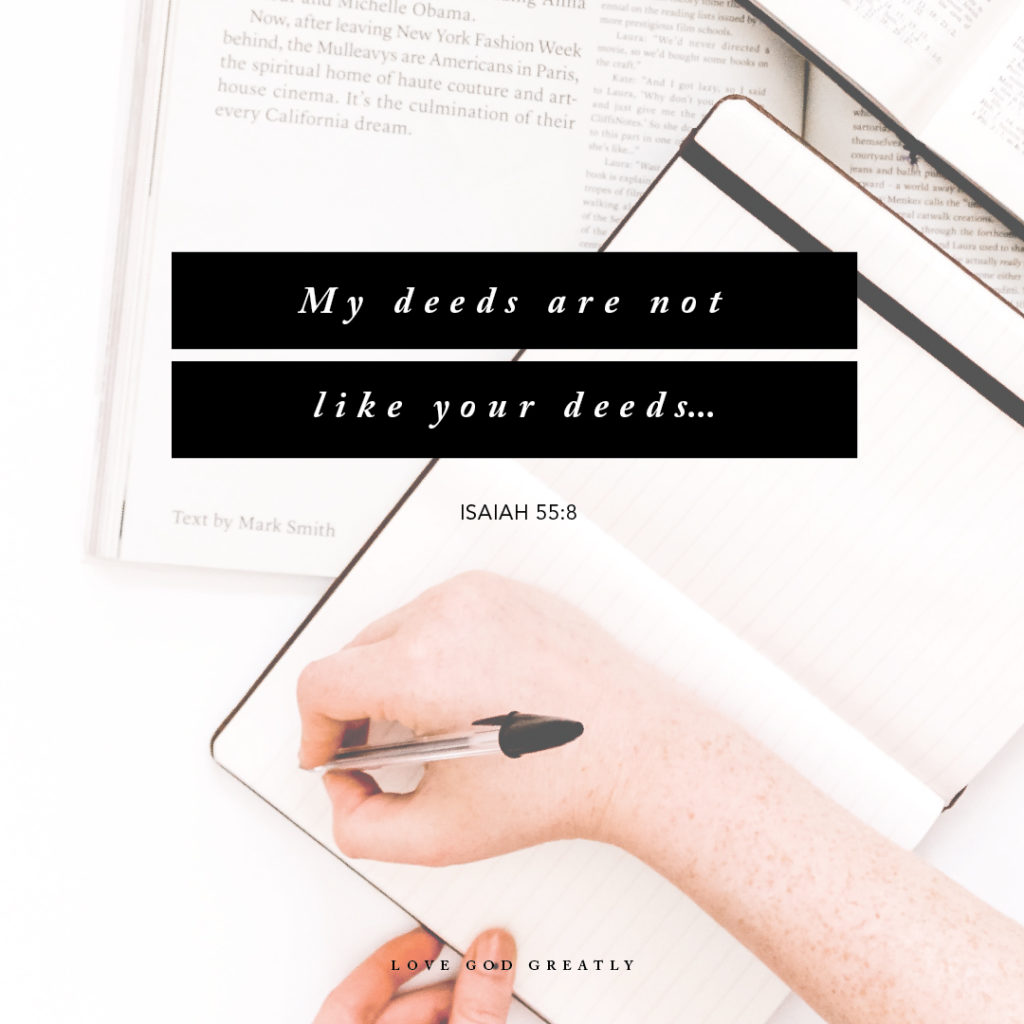
“Indeed, my plans are not like your plans,
and my deeds are not like your deeds,
for just as the sky is higher than the earth,
so my deeds are superior to your deeds
and my plans superior to your plans.
The rain and snow fall from the sky
and do not return,
but instead water the earth
and make it produce and yield crops,
and provide seed for the planter and food for those who must eat.
In the same way, the promise that I make
does not return to me, having accomplished nothing.
No, it is realized as I desire
and is fulfilled as I intend.”
Scripture is full of literary devices. Through the inspiration of the Holy Spirit, the human authors of the Bible were creative and artistic with the words they recorded. Literary devices are used throughout all of the genres of Scripture. You will find similes, metaphors, repetition, symbolism, and personification throughout the Bible. While they are most prevalent in the poetic and prophetic books, the historical writers, Gospel writers, and Epistle writers used all of these devices as well.
Here is a list of common literary devices used in Scripture:
Simile: A form of comparison between two things or ideas. A simile is an explicit, stated comparison, and it typically uses the words “like” or “as.”
Ex: “He is like a tree planted by flowing streams.” – Psalm 1:3
Metaphor: Another form of comparison between two things. It is a comparison of representation, in which one item represents another. A metaphor typically states that something is something else.
Ex: “The Lord is my shepherd.” – Psalm 23:1
Personification: A form of representation in which an inanimate object is given human characteristics or qualities.
Ex: “The ground is in mourning.” – Joel 1:10
Anthropomorphism: Representing God as human. God, who is invisible and immaterial, is often represented with human characteristics.
Ex: “Your right hand delivers me.” – Psalm 138:7
Symbolism: Using a material, physical object to represent a spiritual or moral truth. Sometimes these are explicitly stated in the text, and other times they are implied.
Ex: “For seven days you must eat bread made without yeast, symbolic of affliction.” – Deuteronomy 16:3
Metonymy: Using one noun to represent another noun. In the example below, Moses and the prophets are used to represent the books of the Bible written by Moses and the prophets.
Ex: “They have Moses and the prophets.” – Luke 16:29
Synecdoche: An exchange of related concepts that can be used in several ways. It uses one word to represent another that is connected to it. It can be used to substitute something general for the specific, something specific for the general, the whole for a part, or part for the whole.
Ex: “For our struggle is not against flesh and blood.” – Ephesians 6:12 (Flesh and blood are the part that represents the whole of people themselves.)
Hyperbole: An intentional exaggeration, done in order to emphasize a point.
Ex: “Each one could sling a stone at a single hair and not miss.” – Judges 20:16
Irony: When a speaker uses language that is contrary to the meaning he or she is intending to convey. It typically comes in the form of sarcasm or mockery.
Ex: “How the king of Israel has distinguished himself this day!” – 2 Samuel 6:20
Oxymoron: A statement that takes two words or phrases and that seem contradictory in order to enhance the meaning.
Ex: “Present your bodies as a sacrifice—alive…” – Romans 12:1 (Sacrifices were normally dead animals.)
Repetition: Repeating the same words or phrases in order to make a point or emphasize an idea.
Ex: “You will keep in peace peace.” – Isaiah 26:3 (This is not conveyed in many English translations, but the Hebrew word shalom is repeated twice for emphasis.)
Rhetorical Question: When an author uses a rhetorical question, they are not looking for an answer, but instead, making an argument by posing a question.
Ex: “Are you acquainted with the way the mountain goats give birth?” – Job 39:1
As you review these literary devices, do you see any present in today’s passage?
How was the author using these literary devices to convey his message?
Does this enhance the message of the passage?
Why or why not?
As you conclude your time in God’s Word today, take a few minutes to praise and thank God for His creativity. He used many human authors, over thousands of years, to display His character through the written word. Praise Him for the way His perfect will is accomplished, no matter the plans and wills of people.

Looking for more literary devices to help your writing? Check out this site from Jerry Jenkins
*Literary definitions taken from Gordon Johnston, course notes, Introduction to Biblical Hebrew Poetry, Dallas Theological Seminary, OT104 Hebrew Exegesis and OT History, Spring 2019.
________________________________________________
Looking for our Draw Near journal? Look no further! Did you know when you purchase a Love God Greatly journal you are helping us: 1. Create more ongoing Bible studies. 2. Allow us to generously give God’s Word away around the world, equipping women, small churches and ministries who would otherwise not be able to afford these valuable Bible studies.
THANK YOU for your partnership and support! TOGETHER we are helping to change the world…one Bible study, one translation, one woman at a time! Grab your new journal today in our online store!
Looking for our online Bible study group to join? You can find our Love God Greatly Online Bible Study group here!



